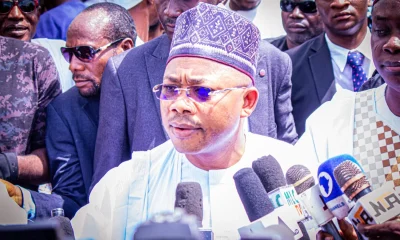Oil & Gas
Modular Refinery programme on Course – Sylva

The Minister of State for Petroleum Resources, Chief Timipre Sylva says the modular refinery programme to boost local production of crude oil in the country is on course.
Sylva disclosed this in an interview in Abuja, on Tuesday.
He said that federal government had licensed a good number of modular refineries and some of them had already started operating effectively.
Reports said that modular refinery generally refers to a simple or complex refinery whose parts are fabricated or constructed in several component parts or units called modules.
These modules can then be assembled easily to form the plant. Furthermore, they can be transported in modules across distances and put together at the location desired.
“Modula refineries, we have licensed quite a bit. I am not in a position to give you an exact figure now but I know that the few of these refineries are under construction and very soon, we will be commissioned.
“You know that last year, we commission the Waltersmith which is functioning well and since then I have also laid foundation stone for Atlantic refinery and there is Niger Delta own that is ongoing, one almost ready to be commissioned in Port Harcourt and there are quite a few.
That programme is on course,’’ he said.
The Minister said that the WalterSmith Petrochemical Refining Company with 5000 barrels per day are currently producing very comfortable and had no problems.
“The Atlantic is not finished yet, they are very much on course to finish construction by first quarter of next year and there are others that are ongoing,’’ he said
NAN reports that the Department of Petroleum Resources (DPR) said that Federal government had as at March 2021 licensed about 23 refineries in the country
Some of the refineries are Waltersmith Refining & Petrochemical Company Limited with 5000 barrels per day (BPD), OPAC Refineries,, Niger Delta Petroleum Resources (Train 3) , Edo Refinery and Petrochemical Company limited and Lowrie Refinery Limited .
Other licensed refineries include Excel Refinery Limited in Bayelsa state, Conodit Refinery Nigeria Limited, Duport Midstream, Duport Midstream in Delta State,Clairgold Oil & Gas Engineering Limited, Ogini Refinery Limited, Etopo Energy Plc and Gasoline Associates International Limited,
Also, NPDC/ND WESTERN OML 34 JV, Frao Oil Nigeria Limited, Kingdom Global Trading Petroleum & Gas Nig. Ltd. Resource Petroleum & Petrochemicals International Incorporated, Gazingstock Petroleum Company Limited and Amakpe International Refineries Limited.
Atlantic International Refineries and Petrochemical Limited, Azikel Petroleum Limited, Allegiance Energy and Power Limited, Alexis Refinery Limited and Dangote Oil Refinery Company were among the licensed refineries
NAN reports that of the 23 refineries, waltersmith Refining and Petrochemical company had completed construction and has been commissioned by President Muhammadu Buhari, OPAC refinery has completed Construction and Plant at Commissioning Stage while Niger Delta Petroleum Resources has also completed Construction completed and Commissioning ongoing.
Also, the Dangote oil refinery company plant overall Installation has gone above 80.3 per cent and Edo refining and Petrochemical company has completed Construction and Plant at Commissioning Stage. (NAN)
Oil & Gas
NNPC Ltd. Disclaims Fake Financial Scheme

The Nigerian National Petroleum Company Limited (NNPC Ltd.) has disowned a fake AI-generated video circulating on social media featuring a cloned voice of the Group CEO, Mr Bayo Ojulari, promoting a fictitious poverty alleviation scheme.
The Chief Corporate Communications Officer, NNPC Ltd.
, Olufemi Soneye in a statement on Thursday clarified that the company had no such investment initiative.Soneye urged the public to disregard the video, originally shared by an account named Mensageiro de Cristo on Facebook.
“NNPC Ltd. has warned the perpetrators to cease their fraudulent actions or face legal consequences,” he said. (NAN)
NEWS
NGEP Urges Gas Reticulation In Buildings

By Olasunkanmi Onifade
Abuja, April 29, 2025 The National Gas Expansion Programme (NGEP) has called on stakeholders to promote the integration of gas reticulation systems in estates, districts, and industrial areas, following best practices seen in developed countries.
Chairman of NGEP, Prof.
Mohammed Ibrahim, made the call on Tuesday during the Builders’ Conference and Annual General Meeting of the Nigerian Institute of Building (NIOB), FCT Chapter, in Abuja.The conference, themed “Gas Reticulation in Building: Design, Safety, Environmental Compliance and Prospects for Builders,” focused on enhancing energy infrastructure in Nigeria’s built environment.
Ibrahim noted that with Nigeria’s vast natural gas reserves, gas reticulation offered a sustainable solution to improve energy accessibility, affordability, and reliability in homes and businesses.
“Gas reticulation in buildings presents a compelling pathway to a more sustainable, efficient, and resilient built environment.
“By prioritising sound design principles and ensuring strict adherence to safety and environmental standards, we can unlock the full potential of natural gas to drive progress,” he said.
He highlighted the key benefits of gas reticulation, including energy efficiency, cost effectiveness, versatility, and reliability.
Also speaking, the Chairman of the Council of Registered Builders of Nigeria, Samson Opaluwah, stressed the importance of capacity building for safe and efficient gas distribution.
He said this involved training engineers, technicians, and other professionals in system design, installation, and maintenance, while also strengthening regulatory frameworks and encouraging local innovation and manufacturing.
The Chairman of NIOB, FCT Chapter, Usman Okehi, emphasised the growing need to incorporate gas systems in residential, commercial, and industrial developments across Nigeria due to rising energy demands and gas availability.
According to him, with this advancement comes the need for strict adherence to design standards, rigorous safety protocols, and full environmental compliance.
“It is our responsibility as professionals and regulators to ensure these systems are functional, safe, and environmentally sound,” Okehi said.
He described the conference as a platform where stakeholders could explore the evolving landscape of gas infrastructure in building projects, share best practices, examine safety and environmental considerations, and assess future opportunities for builders in the sector.
The News Agency of Nigeria (NAN) reports that the Nigerian Institute of Building is the professional body for builders in Nigeria. It traces its origins to the Builders’ Society, established in London in 1834.
Oil & Gas
FG Inaugurates Committee to Enhance Gas Distribution in Urban Buildings

The Ministry of Petroleum Resources has inaugurated a Technical Working Group to enhance gas reticulation practices in Nigeria’s building industry.
The ministry’s Permanent Secretary, Amb. Nicholas Ella inaugurated the Technical Working Group (TWG) between the National Gas Expansion Programme (NGEP) and the Council of Registered Builders of Nigeria (CORBON) on Wednesday.
Reports= says that reticulation refers to the process of creating a network of pipes or tubes to distribute gas or other utilities to buildings or industrial sites.
The permanent secretary restated the importance of creating energy smart cities, saying that modern urban development relies on efficient gas and utility distribution systems,
“Most modern cities in developed countries have evolved to energy smart cities where energy, specifically gas and other utilities are piped to districts and estates.
“However, one of the key tools in creating energy smart city is the National Building
Code which, in essence, sets the guidelines on Building Pre-design, designs, construction and post-construction stages,” he said.
The permanent secretary reiterated the benefits of reticulated gas systems for households and businesses alike, adding that it ensured metered supply akin to water and electricity,
According to him, it eliminates the need for cumbersome refills, and also enhances safety by burying pipes and incorporating advanced safety equipments.
“The TWG is tasked with designing a comprehensive policy to implement best practices for gas reticulation using LPG, PNG, and Bio-Gas across Nigeria’s building sector.
“Key responsibilities include reviewing the current National Building Code, examining global gas distribution systems, and proposing quality standards for materials used in gas installations,” he said.
The permanent secretary emphasised the need for rigorous safety protocols and guidelines to ensure the efficient and safe use of gas in construction.
He urged the group to prioritise environmental sustainability in its recommendations, adding that the group is expected to submit its report by Nov. 15.
Earlier, Mr Samson Opaliwah, the Chairman of CORBON. expressed the council’s commitment to collaborate with the group to ensure safe uptake of gas for use in houses and housing estates in Nigeria.
“I assure you of the williness of CORBON to leverage the expertise and resources at her disposal to ensure that steps are put in place for gas infrastructure in buildings and estates.
“The gas infrastructure will be safe, sustainable and world-class.
” Our collective efforts will yield clear, standardised guidelines for safe and effective gas systems in buildings, matched with a skilled workforce to meet growing demands in Nigeria,” he said. (NAN)



























